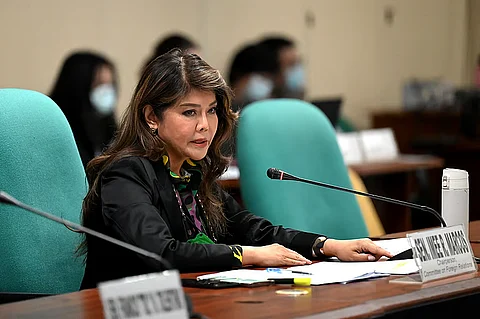
- NEWS
- the EDIT
- COMMENTARY
- BUSINESS
- LIFE
- SHOW
- ACTION
- GLOBAL GOALS
- SNAPS
- DYARYO TIRADA
- MORE

Senator Imee Marcos has urged her brother, President Ferdinand Marcos Jr., to allocate a budget for the Konektadong Pinoy Act (KPA) even if the bill is not yet signed.
In a press statement on Tuesday, Senator Marcos, the bill's author in the Senate, recommended that funding for the KPA be included in the 2026 National Expenditure Program (NEP).
"We are already a generation behind in digitalization. Delaying the implementation of the KPA further poses a serious threat to our nation's development. We must allocate funding for it without delay," she stressed.
The KPA is already in the premises of the Palace and is waiting for the signature of President Marcos Jr. However, it may automatically lapse into law by 23 August, the end of the 30-day default grace period for its signing or vetoing by the President.
The country’s legislative procedure states that the KPA, as an enrolled bill, is the final version of a proposed law, ratified by both the House of Representatives and the Senate, and certified by their respective secretaries.
Moreover, Senator Marcos has called on her brother to immediately sign the newly passed bill and urged the Department of Information and Communications Technology (DICT) to begin drafting its Implementing Rules and Regulations (IRR).
The senator cited President Marcos Jr.'s 2023 State of the Nation Address as a clear rationale for expediting the law's implementation.
"Digitalization is the call of today, not the call of the future, but of the present. It is here. It is needed, and it is needed today. The government must fully embrace digitalization to provide better service to the people, through its vital frontline services and its back-end functions," the President said in his speech.
"If the administration is serious about this commitment, there should be no reason to delay the full passage and implementation of the KPA," Senator Imee said.
She also echoed the observation of Philtrust Bank Chairman Hermogenes Esperon that the President missed an opportunity in his recent SONA to discuss plans for advancing the digital economy.
"Esperon is right. It was a missed opportunity to lay out concrete strategies for growing the digital economy, which has the potential to increase government revenue and help address the country's annual budget deficit," Marcos added.
Various business groups in the country, spearheaded by the Philippine Chamber of Commerce and Industry, have been pushing for the enactment of the KPA, as it seeks to transform the country’s digital infrastructure landscape by promoting faster, more reliable, and more affordable internet connectivity for all Filipinos.
